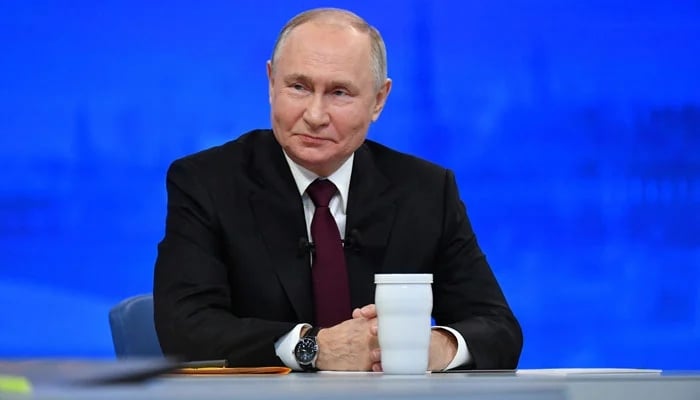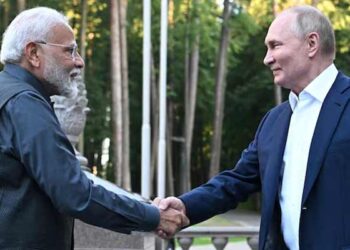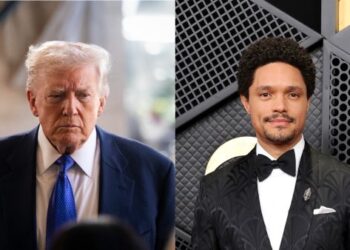Select Language:
Putin Discusses Military Spending and US Relations
Russian President Vladimir Putin engaged in his customary end-of-year press conference and Direct Line Q&A session at the Gostiny Dvor Exhibition Centre in Moscow, Russia, on December 14, 2023. — Reuters
- Putin discusses potential cuts to military spending starting next year.
- No finalized agreement yet between defense and finance ministries, according to Putin.
- The Russian president expresses gratitude to Trump for his peace initiatives.
At a recent press conference in Minsk, President Vladimir Putin stated that relations between Russia and the United States are starting to stabilize, thanks in part to the initiatives of President Donald Trump.
Putin emphasized his "great respect" for Trump and expressed interest in a meeting, acknowledging that such a discussion would require thorough preparation. He remarked that it is "entirely possible."
"In general, the relationship between Russia and the United States is beginning to stabilize, thanks to President Trump’s contributions," Putin stated. "While diplomatic relations aren’t entirely resolved, we’ve taken initial steps and are making progress."
In a surprising announcement, Putin mentioned that Russia is considering reducing military expenditures starting next year, which is a stark contrast to NATO’s recent resolution to increase defense spending over the next decade.
On Wednesday, NATO allies reached an agreement to raise their collective spending target to 5% of their GDP over the next ten years, citing Russia as a long-term threat and emphasizing the need to enhance both civil and military resilience.
In response, Putin criticized NATO’s spending as primarily benefiting the United States and emphasized that it is NATO’s decision, not Russia’s. "But here’s the key point: we plan to cut defense spending. We’re looking at reductions over the next three years," he noted.
He added that while no conclusive agreements have been reached between the ministries of defense, finance, and economy, there’s a general tendency toward reducing military spending in Russia. In contrast, he pointed out that European nations are considering increasing their own expenditures. "So who’s preparing for aggressive actions? Us or them?"
Putin’s statements may be met with skepticism in the West, especially given that Russia has significantly increased military spending since the onset of the war in Ukraine.
The conflict remains unresolved and has escalated in recent weeks, with little advancement toward a ceasefire or a lasting peace agreement.
Putin acknowledged that Russia appreciates Trump’s efforts to bring an end to the war. "He recently admitted that the situation is more complicated than it appeared from the outside. That’s true," Putin acknowledged.
Trump, in speaking to reporters this week, indicated that he believes Putin is seeking a resolution to the conflict, although Ukraine and its European allies have expressed doubts about the Kremlin leader’s intentions to pursue peace and are concerned about further territorial ambitions.
Putin mentioned that Russian and Ukrainian negotiators are in regular communication, and he noted that Moscow is ready to return the remains of 3,000 Ukrainian soldiers.
‘Promising Statements’
In related news, President Trump expressed optimism that developments in the Russia-Ukraine conflict could lead to a resolution, referencing his recent conversation with Putin but providing no specifics. "We’re working on that. President Putin reached out, saying he’d like to assist with Iran, but I said I’d handle that. Help me with Russia first—this is what we need to settle," Trump informed reporters at the White House.
He also voiced appreciation for Putin’s recent remarks, calling them “very nice statements.”
Economic Challenges
Russia is now facing a significant slowdown in economic growth, with its budget strained by declining energy revenues, prompting the central bank to work on lowering inflation.
In 2025, Russia increased its national defense spending by 25% to reach 6.3% of GDP, marking the highest level since the Cold War. Military expenditure now constitutes 32% of the federal budget for that year.
Defense plants have been operating continuously over recent years, and the government has substantially increased bonuses to recruit soldiers and compensation for the families of the fallen.
Putin conceded that the increase in military expenses has contributed to higher inflation rates.
In April, the finance ministry raised its deficit projection for the 2025 budget to 1.7% from an initial estimate of 0.5%, following a 24% reduction in forecasts for energy revenues. The ministry is prepared to draw upon fiscal reserves this year to balance the budget, with the next draft budget expected in the fall.







